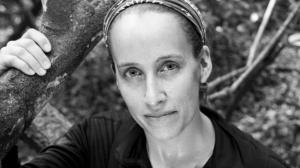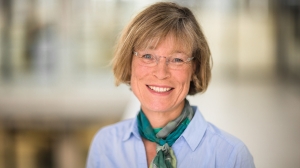Two new Humboldt Professors

Margaret C. Crofoot has accepted a Humboldt Professorship endowed with funding in the amount of five million euros in the University of Konstanz’s research priority Collective Behaviour and Ecology. She is one of the leading scientists worldwide in the data-based analysis of collective animal behaviour. Using GPS technology, the biologist was able to solve one of the key challenges of field research: The GPS transmitters can register and record to the very second the positions and movements of each individual animal in a group.
https://www.youtube.com/watch?v=ON_3LY1V95k
In order to analyze the group dynamics of the many small-scale interactions for the entire animal collective, Margaret C. Crofoot combines data from the transmitters with telephotos taken by drones that provide a picture of the vegetation and ambient conditions. The movement ecology pioneer previously worked at the University of California, Davis (USA) as well as at the Smithsonian Tropical Research Institute in Panama. Crofoot will take up her post as full Professor of Organismal Interactions on 1 July 2019 and join the team of internationally leading researchers involved in the new “Centre for the Advanced Study of Collective Behaviour”, which is one of two Clusters of Excellence at the University of Konstanz funded in the Excellence Strategy of the German federal and state governments.
Professor Margaret C. Crofoot was born in the United States in 1980. Since 2017, she has been an Associate Professor in the Department of Anthropology at the University of California, Davis, USA, and, since 2010, a Research Associate at the Smithsonian Tropical Research Institute in Panama, where she had previously worked as a postdoctoral researcher. Before studying and completing her doctorate at Harvard University, Cambridge, Massachusetts, in 2008, she was an undergraduate at Stanford University in California. Margaret Crofoot has received many honours, including the University of California’s Provost’s Fellowship for Diversity in Teaching in 2016. She is a member of numerous scientific bodies such as the American Association of Physical Anthropologists, the International Primatological Society and the Animal Behavior Society. She also sits on the Executive Board of the ICARUS Initiative, which is chaired by the Max Planck Research award winner Martin Wikelski.
Second Humboldt Professorship awarded to Dr Anke Hoeffler
A second Humboldt Professorship in the area of political economy, endowed with 3.5 million euros, has been accepted by the internationally recognized social scientist Dr Anke Hoeffler from the University of Oxford, who is one of the most frequently cited social scientists in the world. Her research focuses on violence, conflict and civil wars as well as their economic consequences. A significant contribution to academic and public debate in this context has been made by the “greed and grievance” approach, which Anke Hoeffler developed with the British migration researcher Paul Collier. The pair investigated whether civil wars were mainly caused by people suffering political oppression, for example, or for religious or ideological reasons, and how economic aspects, such as advantageous financing, favoured rebellion.
https://www.youtube.com/watch?v=iCpx8MLtExA
The Humboldt Professor will work closely with the University of Konstanz’s new Cluster of Excellence “The Politics of Inequality: Perceptions, Participation and Policies”, which investigates the relationship between inequality and political processes. Hoeffler will actively contribute to the internationally leading conflict and development research carried out at the University of Konstanz. Her appointment is also accompanied by plans to establish a new Centre for Conflict Research and Development Policy, which will investigate development projects in Liberia and the treatment of Syrian refugees in Jordan.
https://www.youtube.com/watch?v=gwDJOSt_XmY
Born in Germany, Dr Anke Hoeffler is currently a research officer at the Centre for the Study of African Economies at the University of Oxford, United Kingdom. She began researching in Oxford in 1999 and completed her doctorate there after studying in Würzburg and London. She has received financial support for her research from institutions like the World Bank and the European Commission. In 2014, Anke Hoeffler was a visiting scholar at the University of Mannheim in Germany. She is a member of various academic bodies and organizations such as the African Economic Research Consortium (AERC) and the International Peace Research Institute Oslo.


